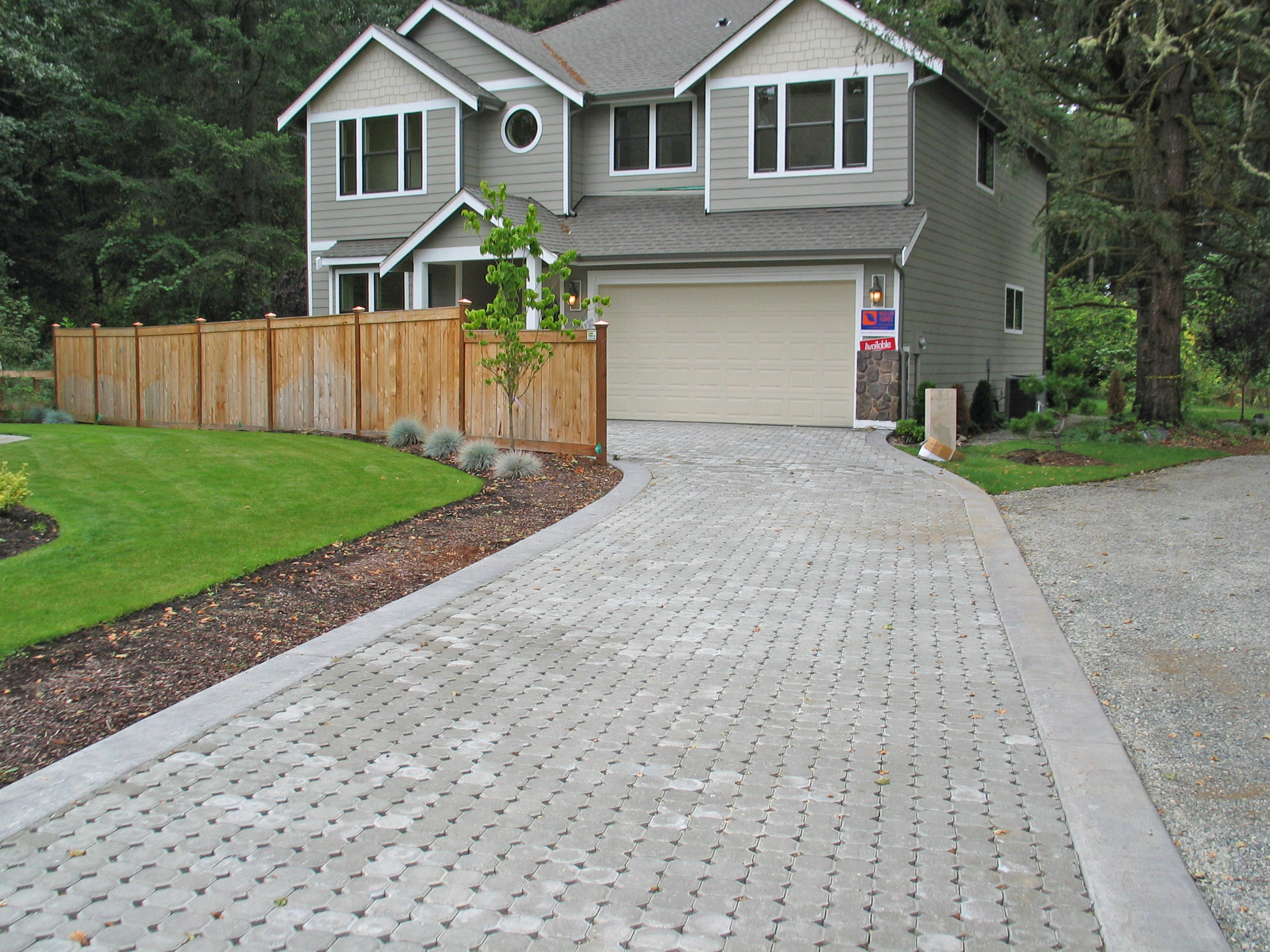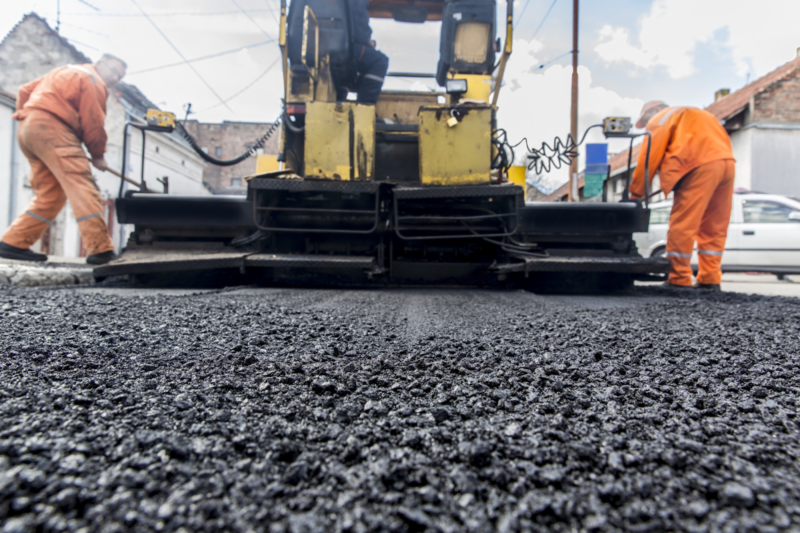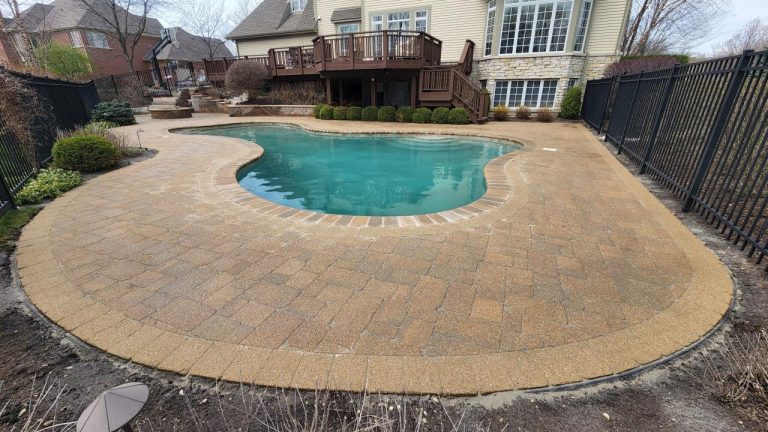Driveway Paving Companies A Comprehensive Guide
Driveway paving companies play a crucial role in transforming homes and businesses. They offer a wide range of services, from initial installation to ongoing maintenance. This guide dives deep into the world of driveway paving, exploring the different companies, services, materials, and considerations for a successful project.
From choosing the right paving material to understanding project timelines and costs, this comprehensive overview equips you with the knowledge to navigate the process effectively. This information covers everything from the different business structures of paving companies to the safety regulations involved.
Introduction to Driveway Paving Companies

Driveway paving companies are specialized contractors focused on the design, construction, and maintenance of driveways. They play a vital role in residential and commercial property development, ensuring safe and aesthetically pleasing access to properties.
These companies handle all aspects of the paving process, from initial design and material selection to the final installation and cleanup. This comprehensive approach ensures a smooth and efficient project for clients, reducing the burden of managing the project independently.
Services Offered
Driveway paving companies typically offer a range of services beyond just laying pavement. These services often include site preparation, excavation, and the installation of necessary infrastructure like drainage systems. Additional services may include the removal of existing driveways and the preparation of the underlying soil for the new paving.
- Design and Consultation: Companies often provide consultations to help homeowners or businesses determine the best design for their driveway, considering factors like traffic flow, aesthetics, and budget.
- Material Procurement: Sourcing and acquiring the necessary paving materials, such as concrete, asphalt, pavers, or brick, is a crucial part of the process.
- Installation: This includes the actual laying and compacting of the chosen paving material, ensuring proper alignment and structural integrity.
- Maintenance: Some companies offer maintenance services to ensure the longevity of the driveway, such as crack repairs and resealing.
Paving Materials
A variety of materials are used for driveway paving, each with its unique characteristics and costs. The choice depends on factors like budget, desired aesthetic, and the specific needs of the project.
- Concrete: Known for its durability and strength, concrete is a popular choice for driveways. It’s relatively low-maintenance and can be molded into various shapes and designs.
- Asphalt: A cost-effective option, asphalt is widely used for its ease of installation and relatively quick turnaround time. It’s a common choice for residential driveways.
- Pavers (Brick, Stone, etc.): These materials offer a more aesthetic appeal and can create unique designs. They are often chosen for their visual impact, but installation can be more complex and potentially more expensive.
Steps in a Driveway Paving Project
A typical driveway paving project follows a sequence of steps to ensure a quality and safe result.
- Site Assessment and Planning: This involves surveying the area, determining the necessary materials, and creating a detailed plan for the project. A detailed assessment considers factors like soil conditions, existing infrastructure, and drainage requirements.
- Excavation and Site Preparation: The existing surface is removed, and the area is prepared to receive the new pavement. This includes grading the ground to ensure proper drainage.
- Installation of Materials: The chosen paving material (concrete, asphalt, pavers, etc.) is installed according to the plan, ensuring proper compaction and alignment.
- Finishing Touches and Inspection: Final adjustments are made to ensure the driveway is level, smooth, and free of defects. An inspection is performed to ensure the project meets all quality standards.
Cost Comparison of Paving Materials
The table below provides a general cost comparison of different paving materials, excluding labor and design costs. These are estimates and can vary significantly based on local material prices and project specifics.
| Material | Approximate Cost (per square foot) | Advantages | Disadvantages |
|---|---|---|---|
| Concrete | $5 – $15 | Durable, strong, customizable | Higher initial cost, longer curing time |
| Asphalt | $3 – $8 | Cost-effective, quick installation | Less durable, requires regular maintenance |
| Pavers | $10 – $30+ | Aesthetically pleasing, customizable designs | More complex installation, higher cost per square foot |
Types of Driveway Paving Companies

Driveway paving companies operate in various structures, each with its strengths and weaknesses. Understanding these differences helps homeowners make informed decisions when selecting a contractor. The size and specialization of a company often influence the scope and quality of services offered.
Large companies, with established reputations and extensive resources, frequently offer a wider array of services and materials, including specialized installations. Smaller companies may have a narrower focus, such as a particular paving material or style, but can sometimes provide more personalized attention and potentially lower overhead costs. The specific business structure of a company also plays a significant role in the services offered and the level of responsibility.
Business Structures
Different business structures affect a paving company’s operations and liability. Understanding these structures helps evaluate a company’s potential longevity and financial stability. Sole proprietorships, partnerships, and limited liability companies (LLCs) are common legal structures.
- Sole Proprietorship: This structure is straightforward to establish, often with minimal paperwork. However, the owner has unlimited personal liability for business debts. This means personal assets could be at risk if the business incurs significant liabilities. A good example of this is a single individual running a small paving business from their home, with no separate business entity.
- Partnership: A partnership involves two or more individuals sharing in the business’s profits and losses. Liability can be shared or unlimited, depending on the partnership agreement. Partnerships can be advantageous for combining skills and resources, but require clear agreements regarding responsibilities and liabilities.
- LLC: Limited Liability Companies offer the advantage of limited liability for owners. This means personal assets are generally protected from business debts and lawsuits. This structure is often preferred by larger companies seeking liability protection.
Services Offered
The scope of services offered varies significantly between large and small companies. Large companies often have a broader service portfolio, from design and permitting to installation and maintenance. They may also have specialized teams for particular materials or installations. Smaller companies might specialize in a specific paving material, such as stamped concrete or interlocking pavers. Their expertise might be focused on a specific style or design.
Specializations
Some driveway paving companies specialize in specific materials or styles. For example, a company might be an expert in permeable pavers, offering solutions for environmentally friendly and water-efficient installations. Other companies may focus on decorative concrete, specializing in custom-stamped designs. Understanding a company’s specialization can help match their expertise to a project’s unique requirements.
Licenses and Permits
Driveway paving companies need appropriate licenses and permits to operate legally. These requirements vary by location and often involve adherence to local building codes. The requirements can be complex and vary by region, including permits for excavation, disposal of materials, and adherence to environmental regulations.
| Business Structure | Pros | Cons |
|---|---|---|
| Sole Proprietorship | Ease of setup, owner retains full control. | Unlimited personal liability, limited access to capital. |
| Partnership | Shared resources and expertise, potentially more capital. | Shared liability, potential disagreements between partners. |
| LLC | Limited liability protection, potentially easier access to capital. | More complex setup and ongoing compliance requirements. |
Services Offered by Driveway Paving Companies

Source: guidebrain.com
Driveway paving companies offer a range of services beyond the initial installation, encompassing various stages of the project lifecycle. These services ensure the long-term integrity and aesthetic appeal of the driveway. Proper planning and execution of these services contribute significantly to the longevity and value of the paved surface.
Beyond the fundamental installation process, comprehensive services cater to the ongoing needs of homeowners. These include essential maintenance, timely repairs, and bespoke design consultations. Effective drainage systems are crucial for preventing water damage and extending the lifespan of the driveway.
Paving Services Beyond Installation
Driveway paving services extend far beyond the initial installation. They encompass a spectrum of maintenance and repair tasks to keep the driveway in pristine condition. These services contribute to the longevity and aesthetic appeal of the paved surface.
- Repair Services: Companies often provide repair services to address cracks, potholes, or other damage that may occur over time. This could involve patching, resurfacing, or complete replacement of damaged sections, depending on the extent of the issue. For example, a small crack might be addressed with a patch, while a larger pothole might necessitate a complete resurfacing of the affected area.
- Maintenance Services: Regular maintenance is crucial for preserving the driveway’s condition. Services may include cleaning, sealing, and addressing minor issues before they escalate into more significant problems. This preventative approach helps maintain the integrity and appearance of the driveway.
- Design Consultation: Experienced paving companies offer design consultation services, helping homeowners create custom driveways that complement their property’s aesthetics and functionality. These consultations can involve discussing materials, colors, patterns, and overall design to ensure a cohesive look.
Importance of Proper Drainage
Proper drainage is paramount in driveway paving projects. Water accumulation can lead to significant damage, including cracking, erosion, and uneven settling of the pavement. Effective drainage systems are crucial for preventing water damage and extending the lifespan of the driveway.
Proper drainage systems divert water away from the driveway, preventing water damage and extending the lifespan of the paved surface.
Careful consideration of the slope and grading of the area is essential to ensure proper water runoff. This often involves working with a professional to design and implement a system that accommodates the specific site conditions. For example, a slight incline can effectively channel water away from the driveway, while a flat surface might require a more elaborate drainage system.
Custom Driveway Design
Designing a custom driveway involves a collaborative process between the homeowner and the paving company. The company helps tailor the design to meet the homeowner’s specific needs and preferences.
- Material Selection: The choice of paving materials, such as concrete, asphalt, pavers, or stone, plays a crucial role in the design. Each material offers unique aesthetic qualities and durability characteristics, which must be considered in the design process.
- Layout and Dimensions: The layout and dimensions of the driveway are determined based on factors such as the size of the property, parking requirements, and the overall aesthetic vision. Careful planning ensures the driveway serves its purpose effectively.
- Aesthetic Considerations: The design process incorporates aesthetic considerations, such as color, pattern, and texture. These elements contribute to the overall appearance and appeal of the driveway.
Site Preparation in Paving Projects
Thorough site preparation is fundamental to the success of any paving project. This stage involves meticulous planning and execution to ensure the stability and longevity of the finished driveway. Effective site preparation is crucial for preventing issues and ensuring the driveway’s long-term performance.
- Grading and Excavation: Precise grading and excavation are critical to establishing proper drainage and ensuring a level surface for the paving material. This involves careful measurements and adjustments to the existing terrain.
- Soil Compaction: Compacting the soil ensures a stable base for the paving material. This prevents settling and ensures the driveway remains level and secure over time.
- Sub-Base Installation: A suitable sub-base is essential to provide support for the paving material. The choice of sub-base material and its installation are critical factors affecting the durability and longevity of the driveway.
Driveway Paving Services Cost
The cost of driveway paving services varies depending on several factors, including the type of material used, the size of the project, and the complexity of the design. It is crucial to obtain detailed cost estimates from various companies to make an informed decision.
| Service | Estimated Cost Range (USD) |
|---|---|
| Driveway Installation (basic) | $5,000 – $15,000 |
| Driveway Repair (small crack) | $200 – $500 |
| Driveway Repair (pothole) | $500 – $2,000 |
| Driveway Maintenance (sealing) | $200 – $800 |
| Custom Driveway Design Consultation | $200 – $500 |
Note: These are estimated ranges, and actual costs may vary.
Choosing a Driveway Paving Company
Selecting the right driveway paving company is crucial for a successful and long-lasting project. A poorly chosen contractor can lead to subpar work, costly repairs, and a frustrating experience. Thorough research and careful evaluation are essential to ensuring the project meets expectations and delivers value.
Careful consideration of factors like experience, reputation, and financial stability will help you avoid potential pitfalls and make an informed decision. This process should focus on identifying a company that possesses the necessary expertise, adheres to industry standards, and is financially sound to complete the project as agreed.
Evaluating a Company’s Experience and Reputation
A company’s experience directly correlates with the quality of its work. Look for a contractor with a proven track record of completing similar projects. Checking their portfolio or past work examples can provide valuable insights into their abilities. Positive reviews and testimonials from previous clients offer valuable perspectives on their work ethic, communication, and professionalism. A reputable company will have a strong online presence with positive reviews on platforms like Google My Business and Yelp.
Verifying Warranties and Guarantees
Warranties and guarantees are critical components of a paving project. They protect your investment by outlining the company’s responsibility for any defects or issues that may arise after the project is complete. A comprehensive warranty should cover materials, workmanship, and any potential structural issues. Carefully review the specifics of the warranty, noting the duration, conditions, and the process for filing claims. Understanding these terms helps mitigate future problems and ensures your rights are protected.
Assessing Financial Stability
A financially stable company is more likely to complete the project as agreed upon. Checking a company’s financial stability can help avoid situations where a contractor may not be able to finish the project due to financial issues. Look for evidence of strong financial standing, such as a clear business structure, positive cash flow, and a demonstrable history of meeting financial obligations. Inquire about the company’s payment schedule and terms to ensure a transparent and reliable process. An established and reputable company is usually a sign of financial stability.
Creating a Checklist for Evaluating Driveway Paving Companies
Thorough evaluation requires a structured approach. The following checklist provides a framework for assessing potential driveway paving companies.
- Company Reputation: Research online reviews, testimonials, and past projects. Look for consistency in positive feedback regarding quality, communication, and professionalism.
- Experience and Expertise: Assess the company’s experience level by examining their portfolio of past projects and references. Inquire about the specific type of paving they specialize in to gauge their proficiency in the chosen materials and techniques.
- Warranty and Guarantees: Review the terms of the warranty and guarantee carefully. Pay close attention to the duration, conditions, and the process for filing claims in case of any issues.
- Financial Stability: Verify the company’s financial stability by checking for evidence of strong business structure, positive cash flow, and a history of meeting financial obligations.
- References and Testimonials: Contact references from previous clients to assess the company’s performance. Assess the quality of the work and the level of customer satisfaction.
- Communication and Responsiveness: Assess the company’s communication and responsiveness. Prompt replies to inquiries and clear communication during the project’s execution are vital.
- Pricing and Payment Terms: Request detailed pricing information and payment terms. Compare quotes from multiple companies to ensure the pricing is competitive and the payment terms are reasonable and transparent.
Driveway Paving Materials: Driveway Paving Companies
Driveway paving materials significantly impact the longevity, aesthetic appeal, and cost of your driveway. Choosing the right material is crucial for a durable and visually pleasing surface that meets your needs and budget. Different materials offer varying degrees of durability, resistance to weather, and ease of maintenance.
A variety of materials are available for driveway paving, each with its own set of advantages and disadvantages. Understanding these characteristics will help you make an informed decision when selecting a paving material for your driveway.
Concrete Driveways
Concrete driveways are a popular choice due to their durability and versatility. They can be molded into various shapes and designs, offering a wide range of aesthetic options. Concrete is highly resistant to many environmental factors and can withstand heavy traffic.
- Durability: Concrete driveways are known for their exceptional strength and resilience, making them a long-lasting option. They can endure years of heavy use without significant wear and tear.
- Cost: Concrete driveways generally fall within a mid-range price point, influenced by factors like the complexity of the design and the amount of labor involved. The cost of materials and labor can vary significantly.
- Aesthetics: Concrete can be colored and textured to create a variety of appealing looks. Stamped concrete, for example, allows for custom designs mimicking natural stone or other materials, adding visual appeal to your property.
- Maintenance: Regular cleaning and sealing are crucial for maintaining the appearance and longevity of a concrete driveway. Sealing helps prevent staining and damage from water and other elements.
Asphalt Driveways, Driveway paving companies
Asphalt driveways are a cost-effective and widely used option. They are relatively easy to install and offer a smooth, even surface. Their adaptability to different designs makes them a popular choice.
- Durability: Asphalt driveways are relatively durable, but their lifespan can be shorter than concrete, especially in high-traffic areas or climates with harsh weather conditions. Proper maintenance can extend the lifespan of an asphalt driveway.
- Cost: Asphalt driveways typically have a lower initial cost compared to concrete, making them a budget-friendly option. The cost also depends on the size and complexity of the project.
- Aesthetics: Asphalt driveways typically have a uniform appearance, although they can be textured or colored to enhance aesthetics. The design options are more limited than with concrete.
- Maintenance: Asphalt requires regular maintenance, including sealing to prevent cracking and damage from water and UV exposure. Crack repairs are essential to maintain its structural integrity.
Paver Driveways
Paver driveways offer a wide array of design possibilities and aesthetic appeal. They consist of individual stones or bricks laid in patterns to create a visually striking driveway. The installation process can be more intricate than concrete or asphalt, but the result is often a unique and beautiful driveway.
- Durability: Pavers, depending on the material, can be highly durable and resistant to damage from traffic and weather. Proper installation and maintenance are critical to preserving their longevity.
- Cost: Paver driveways typically fall in a higher price range than asphalt or concrete due to the cost of materials and the labor required for installation. The complexity of the design and the choice of materials significantly impact the cost.
- Aesthetics: Pavers offer a vast range of design options, from simple patterns to intricate designs. The variety of colors, shapes, and textures available allows for creating a driveway that complements your home’s architectural style.
- Maintenance: Regular cleaning and occasional resealing are necessary to maintain the aesthetic appeal and durability of paver driveways. Sealing helps prevent staining and damage from water.
Material Comparison
| Material | Lifespan (Years) | Cost (Average) | Aesthetic Appeal |
|---|---|---|---|
| Concrete | 20-30+ | Mid-range | High, customizable |
| Asphalt | 10-20 | Low | Moderate |
| Pavers | 25-50+ | High | , Highly customizable |
Project Management and Planning

A well-managed driveway paving project ensures a smooth process from initial planning to completion. Proper planning minimizes potential issues, controls costs, and guarantees a finished product that meets expectations. Effective project management is crucial for achieving successful outcomes.
Careful planning and execution are vital for a driveway paving project to be successful. A detailed understanding of the project timeline, budgeting, permit requirements, and the scope of work is paramount. These elements work together to ensure the project stays on track and within the predetermined budget and timeline.
Typical Project Timeline
A typical driveway paving project can span several weeks, depending on the complexity of the job and the weather conditions. The timeline often involves multiple phases, including site preparation, material delivery, paving, and finishing touches. A well-defined timeline helps maintain project momentum and ensures the project is completed efficiently. Projects involving complex site conditions, extensive repairs, or unique paving materials may require longer timelines.
Importance of Proper Planning and Budgeting
Thorough planning and budgeting are essential for successful driveway paving projects. This involves detailed estimations of labor costs, material expenses, and potential unforeseen issues. Accurate budgeting helps prevent cost overruns and allows for contingency planning. Proper planning also facilitates a more efficient use of resources, leading to timely project completion. Consider examples like a driveway with complex slopes or unusual drainage requirements, where proper planning can save time and money by identifying these issues upfront.
Permitting and Approvals
Obtaining necessary permits and approvals is a critical step in any driveway paving project. These vary depending on local regulations and may involve submitting plans, obtaining inspections, and ensuring compliance with zoning laws. Failure to obtain the required permits can lead to delays, fines, and even project stoppage. Consulting with local authorities beforehand is critical for a smooth process and ensuring compliance with all regulations. Research local regulations thoroughly and contact the relevant authorities to determine the specific requirements for driveway paving projects in your area.
Detailed Scope of Work Document
A detailed scope of work document serves as a contract between the homeowner and the paving company. This document articulates the project’s specific details, including the type of paving material, the dimensions of the driveway, any required repairs, and the expected completion date. It also specifies the responsibilities of both parties, clarifying expectations and mitigating potential disputes. A well-defined scope of work ensures all parties are on the same page and helps to avoid misunderstandings or extra charges during the project.
Typical Phases of a Driveway Paving Project
| Phase | Description |
|---|---|
| Site Preparation | Clearing the area, removing debris, marking the boundaries, and preparing the sub-base for paving. |
| Material Delivery | Delivery and storage of paving materials. This includes verifying the quantity and quality of materials. |
| Paving | Laying and compacting the paving material according to specifications. |
| Finishing | Final grading, sealing, and any additional finishing touches. |
Driveway Paving Company Costs and Pricing
Driveway paving projects vary significantly in cost, depending on numerous factors. Understanding these elements is crucial for homeowners seeking to estimate project expenses accurately. A comprehensive approach to pricing considers materials, labor, project scope, and location-specific variables.
Accurate cost estimations are essential for budgeting and making informed decisions. This section delves into the factors influencing driveway paving pricing, presenting typical pricing structures, highlighting potential hidden costs, and outlining strategies for securing competitive quotes.
Factors Influencing Driveway Paving Pricing
Several key factors contribute to the overall cost of a driveway paving project. These include the type and quantity of paving materials, labor rates in the specific region, the complexity of the project design, and any required permits or site preparation. The size and shape of the driveway, the desired thickness of the paving, and the inclusion of features like retaining walls or drainage systems will all affect the overall expense.
Typical Pricing Structures
Driveway paving companies often employ various pricing models. A common approach involves a per-square-foot rate for the materials and labor. Alternatively, some companies might offer a fixed-price quote for the entire project, factoring in all anticipated expenses. Other options may include a tiered pricing structure based on the complexity of the project. The chosen pricing model should be articulated in the quote and be transparent to the customer.
Examples of Pricing Structures
Consider these examples:
- A basic asphalt driveway, 1000 square feet, might be priced at $5 per square foot, totaling $5,000. This cost includes materials, labor, and standard site preparation.
- A concrete driveway, 1500 square feet, with a decorative border, could cost $8 per square foot, totaling $12,000. The added design elements and potentially higher labor costs are reflected in the price.
- A paver driveway, 2000 square feet, with intricate patterns and retaining walls, could be priced at a higher rate, possibly exceeding $15 per square foot, or even more, depending on the complexity of the design.
Common Hidden Costs
It’s important to be aware of potential hidden costs. These can include unforeseen site conditions like uneven terrain or subsurface obstructions that require extra work. Unforeseen environmental factors such as adverse weather, er impacting the project timeline, can also increase costs. Extra materials for repairs, adjustments, or additional tasks that might arise during the project should be accounted for in the quote. In some cases, permit fees and other governmental regulations might add to the final cost.
Getting Multiple Quotes
Seeking multiple quotes from different companies is crucial for securing the best possible price. When requesting quotes, provide detailed specifications about the project, including the desired materials, size, and design. This enables companies to accurately estimate costs. Compare not only the prices but also the quality of service, experience, and reputation of each company. Read online reviews and check references.
Pricing Models Comparison
| Pricing Model | Description | Example |
|---|---|---|
| Per Square Foot | A set rate for each square foot of driveway. | $6.50 per square foot for a 1000 sq ft asphalt driveway = $6,500 |
| Fixed Price | A single price for the entire project. | $10,000 for a 1200 sq ft concrete driveway, including all labor and materials. |
| Tiered Pricing | Different rates based on project complexity. | $5.50 per sq ft for a simple concrete driveway, $7 per sq ft for a driveway with a retaining wall. |
Driveway Paving Safety and Regulations
Driveway paving projects, while often seemingly straightforward, require meticulous attention to safety protocols and adherence to local regulations. Failure to do so can lead to costly accidents, legal issues, and compromised project timelines. This section details the crucial safety measures and regulatory considerations for driveway paving companies.
Driveway paving operations encompass a range of tasks, from excavation and material transport to concrete pouring and finishing. Each step presents potential hazards, necessitating a comprehensive safety plan to mitigate risks. Adhering to safety protocols and regulations is not just a best practice but a legal and ethical obligation for any paving company.
Safety Measures for Paving Companies
Driveway paving companies must prioritize the safety of their workers and the general public. This includes implementing robust safety measures throughout the entire project lifecycle. These measures go beyond simply providing safety equipment; they encompass a proactive approach to hazard identification and risk mitigation.
- Adherence to Local Building Codes and Regulations: Paving projects are subject to local building codes and regulations, which dictate aspects like permits, required inspections, and acceptable materials. Failing to comply can lead to project delays, fines, or even project rejection. Thoroughly researching and understanding local regulations is crucial.
- Proper Handling and Disposal of Construction Waste: Construction waste, including debris, scrap materials, and excess concrete, must be handled and disposed of responsibly. Companies must adhere to local environmental regulations for waste disposal. This ensures compliance with environmental standards and prevents potential pollution.
- Essential Safety Equipment for Paving Workers: Workers need appropriate safety equipment to protect themselves from potential hazards. This includes safety glasses, hard hats, gloves, steel-toed boots, and high-visibility vests. Regular inspections and maintenance of equipment are also vital to ensuring its effectiveness.
Safety Precautions During Different Stages
A comprehensive safety plan should cover every stage of the driveway paving project. This ensures consistent adherence to safety protocols throughout the project’s duration.
| Project Stage | Safety Precautions |
|---|---|
| Site Preparation |
|
| Material Handling |
|
| Paving and Finishing |
|
| Post-Project Cleanup |
|
Ultimate Conclusion
In conclusion, selecting the right driveway paving company involves careful consideration of various factors, including materials, costs, and project timelines. Understanding the services offered, the company’s reputation, and the specific regulations in your area are essential steps. This guide has provided a thorough overview of the entire process, from initial consultation to final project completion. By understanding the intricacies of driveway paving, homeowners and business owners can make informed decisions and ensure a successful project.





